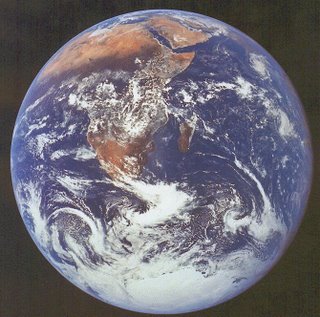 A recent report by the World Wildlife Fund, Living Planet Report, that the demands made by human beings on the earth's natural resources has increased so fast that, even when it comes to renewable resources, the planet is unable to keep pace with our consumption. I was alerted to this report by the 27 November 2006 issue (Vol 195, Number 4754) of the Jesuit newsweekly America. The WWF report calls this state-of-affairs "serious ecological overshoot" and tells us that human beings are "no longer living off nature's interest, but drawing in its capital". A rising tide may lift all boats, as supporters of global capitialistic consumerism like to say, but an ever-rising ocean engulfs (all?) inhabitable land. According to the report, humanity began drawing on nature's capital in the 1980s and has accelerated since then to the point that humanity's demand on the earth's resources has exceeded, presumably renewable, supply by 25%. The global economic inequities are reflected in consumption patterns. Whereas, Africa and Asia have been using less than the world average per capita in biocapacity, North America and the European Union that have far exceeded what can be called excessive development, defined as using the earth's resources at a pace faster than the earth can renew them.
A recent report by the World Wildlife Fund, Living Planet Report, that the demands made by human beings on the earth's natural resources has increased so fast that, even when it comes to renewable resources, the planet is unable to keep pace with our consumption. I was alerted to this report by the 27 November 2006 issue (Vol 195, Number 4754) of the Jesuit newsweekly America. The WWF report calls this state-of-affairs "serious ecological overshoot" and tells us that human beings are "no longer living off nature's interest, but drawing in its capital". A rising tide may lift all boats, as supporters of global capitialistic consumerism like to say, but an ever-rising ocean engulfs (all?) inhabitable land. According to the report, humanity began drawing on nature's capital in the 1980s and has accelerated since then to the point that humanity's demand on the earth's resources has exceeded, presumably renewable, supply by 25%. The global economic inequities are reflected in consumption patterns. Whereas, Africa and Asia have been using less than the world average per capita in biocapacity, North America and the European Union that have far exceeded what can be called excessive development, defined as using the earth's resources at a pace faster than the earth can renew them.In a post on bi-polar morality, which I removed, care for the environment, along with peace and justice, is identified by Pope Benedict XVI as a neglected but important part of the Church's proclamation that makes up one side of the split. On the other side are the issues of the sanctity of human life and marriage, along with a proper understanding of human sexuality. The Church, in her proclamation, must seek to bridge this gap and show that these two parts, like the bi-polar human psyche, are actually part of one whole.
This weekend, having just received it from Netflix, we'll be watching
An Inconvenient Truth.


No comments:
Post a Comment